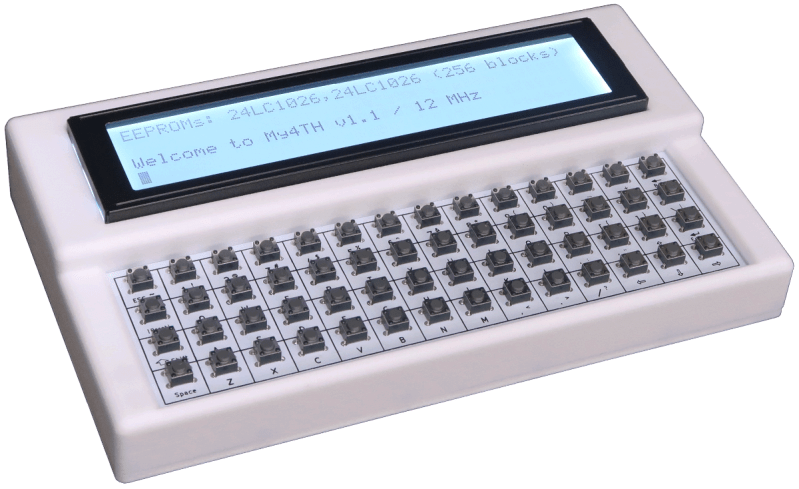When choosing a low-level language, it’s hard to beat the efficiency of Forth while also maintaining some amount of readability. There are open source options for the language which makes it accessible, and it maintains its prevalence in astronomical and other embedded systems for its direct hardware control and streamlined use of limited resources even though the language started over 50 years ago. Unlike 50 years ago, though, you can now take your own self-contained Forth programmer on the go with you.
The small computer is built on a design that [Dennis] built a while back called my4TH which has its own dedicated 8-bit CPU and can store data in a 256 kB EEPROM chip. Everything else needed for the computer is built in as well but that original design didn’t include a few features that this one adds, most notably a small 40×4 character LCD and a keyboard. The build also adds a case to tie everything together, with ports on the back for I2C and power plus an RS232 port. An optional battery circuit lets the computer power up without an external power supply as well.
Part of the appeal of Forth for systems like this is that it includes an interpreter and compiler in addition to the programming language itself, meaning that it has everything needed for a usable computer system built right in. For some more details on this unique language, or if you’d like to explore below the world of Python or C, check out [Elliot]’s discussion on the “hacker’s language.”. While Forth can tackle big problems, it can fit on tiny machines, too.
















If you’ve got an old WikiReader device laying around it runs Forth natively.
Also, anything using Open Firmware. On later Apple PowerBooks (for example), even with no boot disk, you can hold down cmd+opt+O+F during boot to get an interactive ANS Forth environment along with some very basic hardware support.
It was sort of neat; a PCI device could supply drivers, diagnostic tools etc. as Forth code, allowing the same device to work in plug-and-play style on a Power Mac or a Sun workstation or whatever (at least during boot). This was before Java I believe.
You’re right. Suns were running Forth in OpenBoot since the first SPARCs in the late ’80s.
I think a better idea would be a portable thin client forth using some cheap embedded microcontroller that has wifi tcpip… then you could talk to an online forth or whatever.
Maybe so, but you’ve got to respect the fact that this doesn’t even need an MCU. And certainly not a network stack. So, not so much a better idea, but a whole different approach. I think maybe you’re thinking in the conventional 1984 mode, where “The Network IS the Computer”. But each designer is free to choose their own tools and methods.
This is a rabbit hole I wasn’t counting on today! Okay, so it’s a terminal. No, not quite: it’s a single-board computer that uses nothing but 8 CMOS logic chips, and SRAM and EEPROM chips, and 10 more CMOS chips to do the I/O, I guess. This is insane. Reminds me of the MC14500B, for how much it gets done in a few chips (which itself was a pretty deep rabbit hole). It looks like the compromise is that pretty much everything is done in “microcode”, which of course is in FORTH, which means it takes many clocks to do anything at all. But this looks like the sort of thing that could be done in SMD parts and put on a business card, maybe adapted for an OLED display and really tiny tact switches. Because it’s 2024.
Clearly modeled on a Jupiter Ace (which I used to own):
https://en.wikipedia.org/wiki/Jupiter_Ace
Except for Forth and the white case it has nothing in common with the Jupiter Ace. It’s more like a low-end serial architecture computer or calculator of the late 1950s with an obscenely large drum/core/rope storage.
and KC 87/KC 85 keyboard layout ;)
still to fat
look at sinclair polish notation calculator or HP15C with similar idea
look this https://hackaday.io/project/9692-ello-2m thin better keyboard (but no planck/chocolate ;( and )
more flexible. In my opinion hackers need small computer for coding, writing on the go.
But small, thin, cheap and system replacable.
I wonder who decided to call binary kilobytes kilo binary bytes when we could have had the infinitely tastier BiKiBytes
I am at least a tiny bit tempted to port TinyBASIC to this. 😁
FORTH guy: I will build a machine that will make bring FORTH back from the dead.
World: I will port BASIC to it.